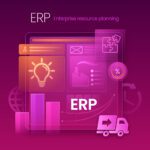Enterprise Resource Planning (ERP) software has emerged as a game-changer for businesses across industries. Companies of all sizes and types are adopting ERP systems to streamline operations, boost efficiency, and optimize workflows. But how exactly does ERP software improve business efficiency? In this article, we’ll dive deep into the benefits and mechanisms that make ERP a crucial tool for modern businesses.
What Is ERP Software?
Before understanding how ERP software enhances business efficiency, it’s essential to define what ERP is. ERP software is an integrated suite of applications designed to help organizations manage and automate key business processes. These processes typically span across finance, human resources, supply chain, sales, procurement, and inventory management. By centralizing data into a single platform, ERP systems enable businesses to gain real-time insights, eliminate manual processes, and improve decision-making.
The Core Features of ERP Software
An ERP system comprises several core features that directly contribute to improving efficiency within an organization. These features include:
-
Centralized Database
All business data is stored in one place, making it easier to access and update. This centralization reduces data redundancy and ensures consistency across departments. -
Automation of Routine Tasks
ERP software automates repetitive tasks like order processing, invoice generation, and payroll management. This reduces human error, saves time, and allows employees to focus on more strategic tasks. -
Real-time Reporting and Analytics
With ERP software, businesses can generate real-time reports on key performance indicators (KPIs). This data is crucial for making informed decisions and quickly addressing any potential issues. -
Cross-departmental Collaboration
Since ERP systems integrate various departments (finance, HR, sales, inventory, etc.), they foster better communication and collaboration between different teams within the organization. -
Scalability and Flexibility
ERP systems can grow with your business. Whether you’re expanding to new locations, increasing product lines, or adding new employees, ERP software can scale to accommodate these changes.
How ERP Software Enhances Business Efficiency
Now that we understand the core features of ERP software, let’s explore how they specifically improve business efficiency.
1. Streamlining Business Processes
One of the primary benefits of ERP software is its ability to streamline business processes. By automating manual tasks and integrating various business functions, an ERP system reduces the need for redundant processes. This not only saves time but also eliminates the risk of errors that could occur in manual work.
For example, an ERP system can automatically generate sales orders from customer inquiries, update inventory levels, and create purchase orders for stock replenishment. By automating these steps, businesses can minimize delays and optimize their supply chain operations.
2. Improved Data Accuracy
Data accuracy is crucial for efficient decision-making, and ERP software significantly enhances data integrity. Since ERP systems centralize data, there is less room for errors caused by manual data entry or data silos between departments. With accurate, real-time information, businesses can make better decisions that impact operations, financial management, and overall performance.
3. Better Decision-Making with Real-Time Insights
ERP software provides businesses with real-time data analytics and reporting, which helps managers make well-informed decisions. These reports give insights into key business functions such as sales, inventory, production, and financials. Decision-makers can quickly identify areas that need improvement and address potential issues before they escalate.
For instance, an ERP system might show a sudden dip in sales or highlight an increase in production costs. With this knowledge, managers can adjust strategies in real time, leading to faster, more efficient operations.
4. Enhanced Customer Relationship Management
ERP software often includes customer relationship management (CRM) tools that allow businesses to better manage interactions with customers. With all customer data in one system, businesses can track customer orders, preferences, and communication history. This leads to improved customer service, quicker responses to inquiries, and the ability to provide personalized experiences.
Moreover, ERP systems enable businesses to analyze customer trends and behavior, which can inform sales strategies and marketing efforts. By understanding customer needs, companies can improve their product offerings and overall customer satisfaction.
5. Optimized Inventory and Supply Chain Management
Inventory management is one of the most critical functions in any business, especially for retail and manufacturing companies. ERP software helps optimize inventory levels by providing real-time visibility into stock availability, sales forecasts, and reorder points.
With the help of ERP, businesses can implement just-in-time (JIT) inventory practices, which reduce excess stock and storage costs. Additionally, ERP software helps businesses track supplier performance, automate purchase orders, and streamline the procurement process. This creates a more efficient supply chain that can respond quickly to market changes.

Unlock Procurement
Efficiency Today!
Streamline vendor management, automate
compliance, and reduce procurement costs.
6. Cost Savings and Resource Optimization
By automating processes and improving data accuracy, ERP software helps businesses save costs across various departments. For example, HR departments can automate payroll processing and employee record management, while finance teams can eliminate the need for manual accounting processes.
Furthermore, ERP systems help companies optimize resource usage, whether it’s raw materials, labor, or capital. By gaining a comprehensive view of business operations, companies can allocate resources more effectively, ensuring that resources are used in the most efficient manner possible.
7. Improved Compliance and Risk Management
Compliance with regulations and industry standards is critical for businesses, especially those operating in regulated sectors like healthcare, finance, and manufacturing. ERP systems help businesses adhere to compliance requirements by automating key tasks such as data entry, reporting, and record-keeping.
Additionally, ERP systems provide enhanced security features that protect sensitive data, reducing the risk of data breaches. Businesses can also track audit trails and ensure that they are following best practices in terms of risk management.
8. Scalability and Flexibility for Growth
As businesses grow, so do their operational complexities. ERP software provides the flexibility to scale operations without sacrificing efficiency. Whether expanding to new regions, launching new product lines, or managing an increasing number of employees, ERP systems can adapt to meet these new demands.
Cloud-based ERP systems, in particular, offer added flexibility by allowing businesses to access their data from anywhere and on any device. This scalability ensures that businesses can continue to operate efficiently as they grow.

Automate Compliance Across All Vendors
Track certifications and keep your compliance records audit-ready.
9. Improved Collaboration and Communication
One of the challenges businesses face is poor communication and collaboration between departments. ERP software helps improve collaboration by offering a centralized platform where teams can access shared data and communicate effectively. With everyone on the same page, there is less room for misunderstandings or delays caused by miscommunication.
For example, the sales team can directly access real-time inventory data, while the finance department can track customer payments and outstanding balances. This level of integration fosters a more cohesive workflow and minimizes the chance of errors that stem from disconnected systems.
10. Better Employee Productivity
By automating routine tasks, providing real-time data, and improving collaboration, ERP software enhances employee productivity. Instead of spending valuable time on manual, repetitive tasks, employees can focus on higher-value activities that contribute to business growth.
For example, a production manager can use ERP software to track the status of orders and production schedules, while a salesperson can access customer data and make informed decisions quickly. By freeing up employees from mundane tasks, ERP systems enable them to perform more efficiently and contribute more meaningfully to the organization.
Choosing the Right ERP Software for Your Business
When selecting an ERP system, it’s important to consider factors like industry-specific needs, scalability, ease of use, and integration with existing systems. Here are some tips to help you choose the best ERP software:
-
Identify Your Needs: Understand the specific challenges your business faces and what functionalities you need from an ERP system.
-
Look for Industry-Specific Solutions: Some ERP systems are tailored to specific industries, like manufacturing, healthcare, or retail.
-
Consider User-Friendliness: Choose an ERP system that is easy for employees to learn and use, ensuring smooth adoption.
-
Evaluate Integration Capabilities: Make sure the ERP software can integrate with your existing systems and tools.
-
Check for Cloud-Based Options: Cloud ERP systems offer greater flexibility and scalability, which is essential for growing businesses.
Conclusion
In today’s fast-paced business environment, efficiency is the key to success. ERP software offers a comprehensive solution to help businesses improve their operations, reduce costs, and drive growth. By centralizing data, automating processes, and providing real-time insights, ERP systems enable businesses to streamline operations, make better decisions, and boost productivity. As businesses continue to scale, ERP software will remain an essential tool for improving business efficiency and maintaining a competitive edge.
By adopting ERP software, businesses can unlock significant advantages in terms of operational efficiency, cost savings, and resource optimization. As a result, investing in the right ERP system is not just a smart move—it’s an essential step toward achieving long-term success.




